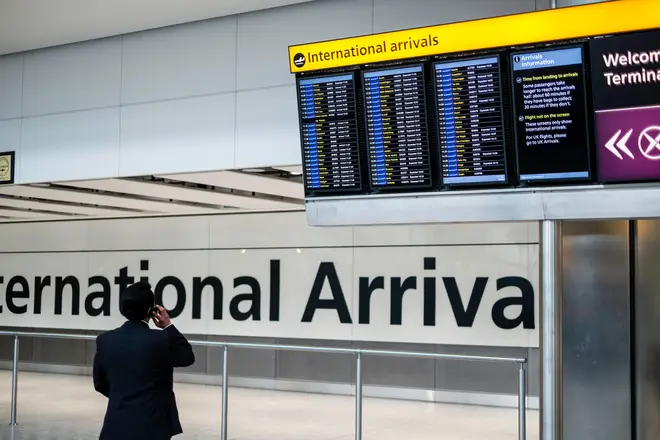
Richard Spurr 1am - 4am
3 October 2021, 10:22

UK travel rules are set to change this week as the traffic light system is scrapped and a single list of red countries is introduced.
The government hopes that the latest changes will make travel cheaper and easier following months of disruption to the travel industry.
Passengers have faced frequent changes to international rules in recent months as coronavirus restrictions have eased amid increasing vaccination rates.
The new rules will come into force at 4am on Monday.
Countries such as Brazil, Mexico and South Africa will remain on the UK's red list, but the green and amber lists will be scrapped and replaced by a single list of low risk countries.
Read more: Holiday bookings surge 'by 200 per cent' as rip-off Covid travel tests are scrapped
Travellers will also not have to provide proof of a negative lateral flow test prior to arriving in the UK, but will still have to fill out a passenger locator form.
Children under 11 are already exempt from pre-flight tests.
Previously, travellers returning from amber list countries had to take a coronavirus test three days before travelling to England and pay around £65 for a PCR test on day two after arrival.
TRAVEL UPDATE🔊: we’re making testing easier for travel 🧳💉 From Mon 4 Oct, if you’re fully vax you won’t need a pre-departure test before arrival into England from a non-red country and from later in Oct, will be able to replace the day 2 PCR test with a cheaper lateral flow.
— Rt Hon Grant Shapps MP (@grantshapps) September 17, 2021
Passengers who are not fully vaccinated or who have been vaccinated with a vaccine not recognised by the UK have also had to isolate for 10 days and take a second test on day eight.
This is all set to be scrapped with the binning of the amber list.
But travellers from red list countries will still have to quarantine in designated hotels, costing £2,285 per person as rules remain unchanged.
Over 130 countries and territories are currently on the UK's amber list, including popular holiday destinations such as France and Italy.
Announcing the plans in September, Transport Secretary Grant Shapps said: "Today’s changes mean a simpler, more straightforward system.
"One with less testing and lower costs, allowing more people to travel, see loved ones or conduct business around the world while providing a boost for the travel industry."
Read more: Girl, 15, dies of Covid the same day she planned to have vaccine

CYW chair urges Tories to step up their game
Later this month travellers will face further upheaval as costly PCR tests after arrival will be replaced with lateral flow tests.
Following the announcement holiday bookings surged as Thomas Cook boss revealed half-term bookings were up 200% on August levels.
Read more: PM to appoint head of Covid inquiry by Christmas after meeting bereaved families
He said: "Based on our bookings already today, I would expect this weekend to be the biggest of the year so far as people take advantage of the great deals on offer, the new easier rules on testing and the simplified system for international travel."
The Transport Secretary said he hopes the changes will come into force in time for the half-term holiday.
In September eight countries were removed from the red list: Turkey, Pakistan, the Maldives, Egypt, Sri Lanka, Oman, Bangladesh and Kenya.
The Welsh Government have confirmed that they will mirror the changes for travellers returning to England, including merging the green and amber lists and scrapping pre-departure testing.

Govt's ability to make 'correct decisions' at 'right time' is 'missing
But they raised concerns about the plans. Minister for Health and Social Services Eluned Morgan said: "We have regularly called for a careful approach to international travel to prevent coronavirus being re-imported into the UK, especially new and emerging variants which may not respond to the vaccines.
Read more: Boris Johnson promises 'big, bold decisions' amid fears of a winter crisis
"The decision to move away from PCR tests from returning travellers on day two is concerning. This test, combined with genetic sequencing of all positive tests, is a vital part of our surveillance for coronavirus and protects our borders from the virus.
"We recognise the communication and enforcement challenges in having different testing requirements, and continue to thoroughly examine the evidence for a Wales-only testing regime, but the strongest solution to protect public health is for the UK government to reinstate UK-wide testing."